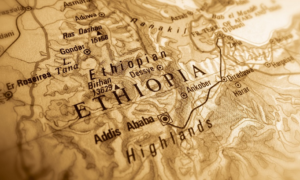Dr. Adam Kamil Faris, 58, was born in the Gefare farmers community of Semen Wollo. When he was seven, he went to Saudi Arabia after the death of his parents, and grew up there under the guardianship of his brother, a citizen of Saudi Arabia. He attended his primary education and secondary in Mecca. Afterwards, he was graduated in distinction with BA in Public Administration, Political Science and Economics from Kind Abdulaziz University in Jiddah in 1982. Then after, he was engaged in tourism business in Ethiopia until his license was taken away by the then socialist regime. He returned to Saudi and engaged in construction business and commerce.
Following the regime change in Ethiopia, he also formed his own free press and participated in the Ethiopian media. Finally, he devoted all his time for studying Ethiopia’s place and image in Islam. Adam received his MA and Ph.D. in Islamic moderation [thought] and Africa and Islam from Riyadh University and King Abdulahi Centre for Tolerance. He again obtained his assistance professorship from Uganda’s Islamic University.
Currently, his is carrying out his MA and Ph.D. studies in the early Muslim’s migration to [Abyssinia] Ethiopia and its objectives and the laws formulated during the time of King Negash after he held discussions with the Islamic Migrants. Adam says this ancient experience could be used as a model in this age of migrant mistreatment and crisis. Because the Islamic migrants from Arabia were received with open arms by the then Ethiopian king and people. He says he has been studying these and related phenomenon for the past 27 years.
Journalists from the Ethiopian Press Agency sat down with Adam Kamil to discuss Ethiopia’s Islamic history and its implication for and relationship with the Arab/Muslim world. Excerpts. On his long studies Some incidences in my life triggered me to study Ethiopia’s Islamic history . My university teacher once held my hand and told me, ‘You Habesha people, let alone you come to know your honourable place in Islam, you don’t even read what was written about you’. Another Egyptian friend of mine also once told me that if Bilal [Ibn Rabah], [an Ethiopian and one of the most trusted and loyal companions of the Islamic prophet Muhammad], we would have venerated him. In addition, my strong will to promote the history of king Negash and his role in the […]
Click here to view original web page at www.ethpress.gov.et






